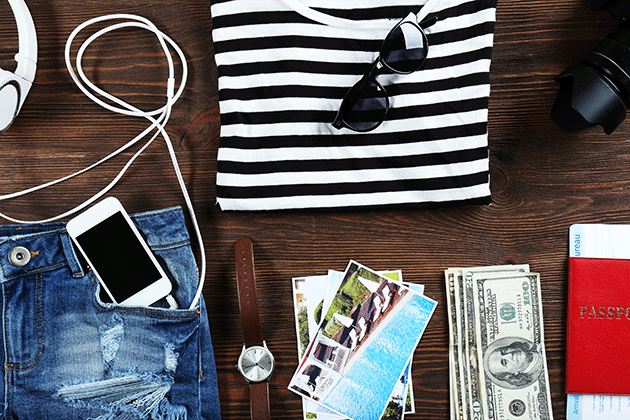Transaction fees are probably far from your mind when planning an exciting holiday overseas, but a little pre-trip planning will keep your additional card and payment fees low by helping you stay aware of your budgeting priorities on your trip. These are some of the most common ways to pay overseas and their benefits and limitations.
Choosing a payment option
When you’re choosing payment options, consider your destinations and the availability of Internet and ATM access. Take into account what you’ll be doing on your trip and how fixed your spending will be from day to day. Sometimes it might be advantageous to lock in exchange rates before your journey; other times, it’ll be more important to have a diversity of currencies available before your trip.
Aim to balance practicality, security, and convenience with minimising transaction fees. Use two or more payment options so that you’ll always have quick access to your spending money.
Cash
Cash is useful for incidental spending and miscellaneous costs, and it’s relatively easy to find a currency exchange store to buy some foreign currency. Cash can be a good way to budget, but avoid carrying too much cash for security reasons. By not exclusively relying on cash, you are less likely to lose all your holiday spending money if you lose your wallet.
Credit cards
Credit cards are convenient to use as they’re widely accepted. However, they attract higher fees. In addition to unknown currency exchange rates with each transaction, your credit card issuer charges you a percentage-based currency conversion fee, which is typicallytwo to three per cent or more of your transaction value. Sometimes a fixed foreign transaction fee is added on top of the percentage fee. It’s a good idea to do a quick calculation before you pay with your credit card so you know the exact dollar amount of the conversion fee. There are some credit cards that waive foreign exchange fees, but these are less common.
Some premium credit cards offer added benefits such as free travel and medical insurance, so it could be cost effective for you to use your credit card during your trip if your credit card offers this feature. Additionally, remember to keep track of your statements and pay off the balance to avoid any late payment fees and interest charges.
Cash advances
Cash advances attract a whole range of fees including both local operator and international ATM fees, cash advance fees, currency conversion fees, and interest charges. While the ATM fees are fixed, the remaining fees are calculated as a percentage of the amount withdrawn, so you could end up paying a lot extra for a cash advance. Cash advances are probably an option to consider only if you have no alternatives at hand, or if you have a positive balance on your credit card that fully offsets the amount withdrawn.
Debit cards
A debit card on your everyday transaction account is another option to keep in mind when travelling. Many transaction accounts offer ATM cards with debit card features, so you can use it to make local ATM withdrawals as well as debit purchases.
Because you’re using your own money, you’ll pay no interest charges, unlike credit card purchases that remain unpaid past the interest-free period or cash advances. Still, it remains that you won’t know the exchange rate beforehand and you’ll still need to pay a currency conversion fee whether you’re making a purchase or withdrawing cash from a local ATM.
Travel money cards
Preloaded travel money cards are an ideal option for travelers. These cards are issued by many financial institutions, and they can be loaded with multiple types of currency. You can use it as an ATM card overseas as well as use it to make purchases. The benefits include locking in an exchange rate before you go, no currency exchange fees, and fraud protection.
If you do exceed the loaded amount, the purchase may be taken from the other currencies loaded on the card, so in that case you do pay a currency exchange fee. As such, always check your balance when using these travel money cards to make sure you don’t exceed the available amount.
There are different cards on the market and some cards do come with free overseas ATM withdrawals, though local operators may charge a fee. Others charge a reload fee, though many issuers don’t, so research and compare different products before you purchase one of these money cards.
Travellers cheques
While less common these days, travelers cheques are still an alternative for travelers who want the option of locking in a certain exchange rate and the added security of ID requirements before being cashed. Travellers cheques are a very secure option as they can be cancelled with a phone call to your issuer at any time.
Travellers cheques do come with fees, commissions, and charges for purchase and cashing, so make sure you are aware of these before making a decision. Some places don’t accept travellers cheques and certain destinations may be limited in terms of exchanges where you can cash them, so do some research before you settle on this option.
Sticking to a budget
Now that you’ve thought about how you’re going to access your money, you might want to consider how to save money while you’re traveling. Check out our in-depth interactive guide to traveling on a budget here.



